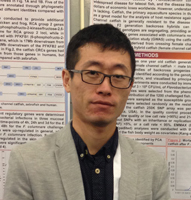Dr. Folefac Aminkeng, first place winner in this year’s Abstract Challenge, will present his work to the community via a live webcast on Wednesday, April 20th at noon EDT. Dr. Aminkeng is a Postdoctoral Fellow at The Centre for Molecular Medicine and Therapeutics (CMMT) at the University of British Columbia in Vancouver, BC. Aminkeng’s research focus is the pharmacogenomics of adverse… Read more »
Recent Customer Publications Recently we announced that our customers named the Golden Helix software in 1,000 published articles! It was quite an honor for us and we are excited to start working toward 2,000. To start us off, here are a few of our recent customer publications. Fielding Hejtmancik and his colleagues at the NEI published, Polymorphism rs7278468 is associated with… Read more »
Customer success is very important to us at Golden Helix. Every month we showcase their success by putting together a blog post highlighting the most recent publications. We have been compiling this list since 2003 (you can find the full list here). Today, I am very honored to announce that the Golden Helix software has assisted in one thousand publications. We have enjoyed… Read more »
We, at Golden Helix, would like to take the time to highlight one of our long time customers on her recent success. Since the beginning of 2015, Dr. Kazima Bulayeva of the Vavilov Institute of General Genetics (VIGG), has published in 10 scientific publications including two times Nature Genetics. We are very excited to share the research she is performing using the… Read more »
We want to say congratulations to all of our customers who have recently published! It’s always great to see all the new research and advancements our clients are doing, and how the Golden Helix software is assisting in that. With that, here are the most recent customer publications for the month! L. Nguyen and Russel Lyons of the University of… Read more »
Benjamin Darbro, MD, PhD at the University of Iowa, uses VarSeq® software for Clinical Testing Founded by Hans Zellweger in the 1960’s, The Shivanand R. Patil Cytogenetics and Molecular Lab at the University of Iowa has a long history of clinical testing, seeing 45 years of advancements. Today, the lab is mainly focused on oncology, pre and post-natal genetics testing… Read more »
The Golden Helix Soccer Team I recently received a very special email from a long time Golden Helix customer, Dr. Vanessa Hayes of the Garvan Institute of Medical Research in Sydney, Australia. In 2010 Dr. Hayes, then of the J. Craig Venter Institute, joined several colleagues in collaboration on The Southern African Genome Project. The project was aimed at including African genomes in existing… Read more »
Hope everyone’s new year is off to a great start! Golden Helix has been having wonderful start and have so much to look forward throughout the year. We wanted to share with you the list of our first round of customer publications for 2016, enjoy! Petra Werner of the Children’s Hospital of Philadelphia and colleagues published MESP1 Mutations in Patients with Congenital… Read more »
Recent Customer Publications We are halfway through November, and it’s hard to believe how fast the holidays are approaching. Today, we wanted to recognize recent customer publications all over the world, from China to Australia and back to the United States. Congratulations to all who published, and we hope to see many more through the end of the year! Mark… Read more »
The month of October is flying by, and we have already had some great publications by some of our customers here at Golden Helix. We wanted to share them with you, and hope you find them as interesting as we did. Congrats to all who published! Bahram Namjou of the Cincinnati Children’s Hospital and colleagues published A GWAS Study on… Read more »
Our final webcast presentation in the series of winners from our Annual Abstract Challenge is first place recipient Dr. Sergey Kornilov. A Postdoctoral Associate in the Child Study Center at Yale University’s School of Medicine, Dr. Kornilov’s submission focused on the genetic basis of developmental language disorders in a geographically isolated Russian-speaking population. Next week on October 14th, he will… Read more »
This month we wanted to highlight four publications from a few of our valued customers. Congrats to all! Zuemei Ji and Christopher Amos of Dartmouth University published The Role of Haplotype in 15q25.1 Locus in Lung Cancer Risk: Results of Scanning chromosome 15 in the Oxford Journals which analyzed lung cancer patients and a control study to determine that rs588765-rs16969968 may… Read more »
The past few months our webcast has featured a winner from our Annual Abstract Challenge, and we are happy to have our second place winner, Hilal Al Shekaili, as our speaker for September. Hilal’s submission surrounded novel genetic variants in a consanguineous family with pyridoxine-dependent epilepsy, and he will speak on his studies next Wednesday, September 9th (register here). To… Read more »
August is off to a great start, especially for some of our customers who have recently published. I wanted to take a minute to share their work with you. Gabor Meszaros of BOKU University Vienna and colleagues published Genome-Wide Selection Signatures in Pinzgau Cattle in Potravinarstvo Scientific Journal for Food Industry which used SNP BeadChips to identifygenomic regions near QTL associated… Read more »
Today I wanted to take a moment to recognize a long-time Golden Helix customer, Dr. Folefac Aminkeng of the Canadian Pharmacogenomics Network for Drug Safety and the University of British Columbia on his recent publication A coding variant in RARG confers susceptibility to anthracycline-induced cardiotoxicity in childhood cancer, in Nature Genetics. Aminkeng and his colleagues performed a genome-wide association study in… Read more »
Last month our webcast featured the third place winner of our Annual Abstract Challenge, Dr. Raluca Mateescu, and August’s webcast will feature co-winner, Dr. Vivien Sheehan. Dr. Sheehan’s submission last winter surrounded the pharmacogenomics of hydroxyurea in sickle cell anemia, and we are excited to have her present this research for our Golden Helix community next week (August 12th, register… Read more »
Today we wanted to share a recent client case study that demonstrates how our SVS software is being used both in the classroom and laboratory to do livestock genetic analysis. If you have any questions or would like to learn more about SVS, please contact us at [email protected]. Dr. Heather Huson is a Professor of Dairy Cattle Genetics at Cornell… Read more »
Congratulations to all of our customers who have recently published! It’s always a pleasure to see the interesting and useful work conducted in part with the aid of our software, and we hope you enjoy reading about it as well. Bradley Aouzierat of UCSF and colleagues published Association of IFNL3 and IFNL4 polymorphisms with liver-related mortality in a multiracial cohort… Read more »
Recently, customer Xin Geng of Auburn University published a paper using SVS, and we wanted to share his story with you. Please feel free to contact us if you have questions or if you would like to learn more about SVS at [email protected]. For PhD graduate student Xin Geng, conducting Genome Wide Association Study (GWAS) to uncover the quantitative trait… Read more »
It is already almost halfway through 2015, and June has been especially busy as far as customer publication goes. We wanted to pass on the articles to you and congratulate our customers on their success! Elena Gusareva and Kristel Van Steen of the University of Liege and colleagues recently published A cautionary note on the impact of protocol changes for genome-wide… Read more »













